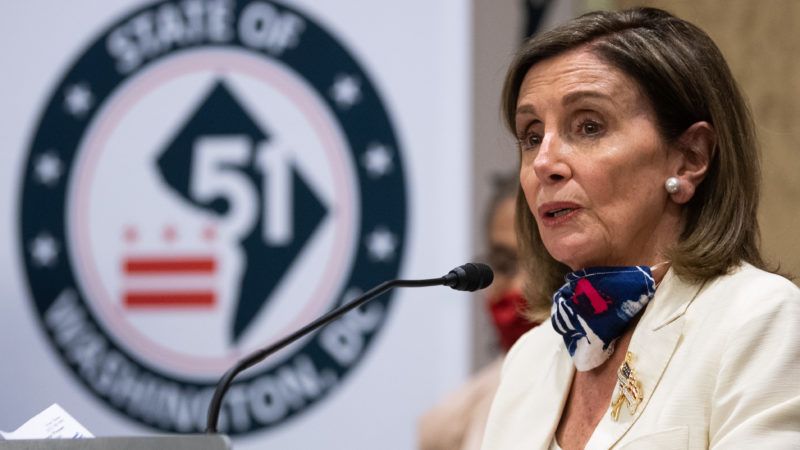House of Representatives Votes to Give D.C. Statehood
The House voted to recognize the District of Columbia as a state, but many obstacles still lie ahead.

The House of Representatives voted on Friday to recognize the District of Columbia as the 51st state.
The bill, H.R. 51, passed 232-180, predominantly along partisan lines. Every Democrat but Rep. Collin Peterson (D–Minn.) voted for it, while most Republicans—and Libertarian Rep. Justin Amash (Mich.)—voted against it. Nineteen Republicans abstained.
The bill would rename the District of Columbia as the Douglass Commonwealth, a tribute to Frederick Douglass that keeps the D.C. abbreviation. The new state would be granted two representatives and one senator with full congressional voting rights—a privilege the District does not currently enjoy. It would also carve out a much smaller federal district consisting of a cluster of government offices and buildings.
An earlier D.C. statehood bill, also titled H.R. 51, made it to the floor of the House in 1992, but failed in a 153-277 vote.
A surge of attention to contemporary racial justice issues has prompted a renewed interest in the cause. Racial minorities are a majority of D.C.'s residents, and some advocates have come to view the District's lack of congressional representation as a form of racism.
While the House vote marks a huge win for advocates and brings D.C. closer than ever to statehood, there are still significant obstacles ahead.
Some critics argue that D.C. statehood may require a constitutional amendment. According to Cornell's Legal Information Institute, the District was created to be "removed from the control of any state" under the jurisdiction of Congress. Although the House bill ostensibly corrects for this by outlining new, smaller borders for a federal district, Cato Institute legal scholar Roger Pilon argues that because the Constitution draws no distinction between the seat of government and the federal district, the current borders must remain intact.
Other critics dismiss the push for D.C. statehood as a ploy to increase Democratic sway in Congress. "D.C. will never be a state," President Donald Trump told the New York Post. "Why? So we can have two more Democratic—Democrat senators and five more congressmen? No thank you. That'll never happen."
One way to alleviate such concerns would be to create two new states, one that leans Democrat, the other that leans Republican. A proposal by RealClearPolitics columnist Frank Mieli argues that both the District and a predominantly Republican region, such as eastern Washington state, be granted statehood.
Still other critics of D.C. statehood argue that most of the District's current land could be retroceded to its northern neighbor, Maryland. Under such a plan, the residential areas of the District would become Douglass County.
D.C. has retroceded land in the past to Virginia, and the city was built on territory gifted by Virginia and Maryland. Because this proposal does not involve adding any new members to Congress, it would avoid upsetting the current political balance in that body.
The idea of granting statehood to D.C. is very popular among residents of the city, but most of the rest of the country remains either opposed or indifferent to the issue. Indeed, a Hill-HarrisX poll found that 52 percent of Americans reject the idea. While support has jumped from 29 percent last year, the statehood movement still has many hearts and minds to win over.


Show Comments (107)